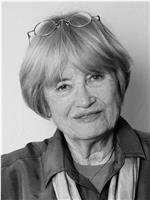杰奎琳·弗芙 Jacqueline Veuve Jacqueline Veuve

- 性别:女
- 星座:水瓶座
- 出生日期:1930-01-29
- 出生地:瑞士,贝耶纳
- 职业:导演 / 编剧 / 制片人
- 更多外文名:Jacqueline Reber (本名)
杰奎琳·弗芙 Jacqueline Veuve简介
影人资料
Before collaborating with Jean Rouch at Paris' Musée de l'Homme in 1955 and with Richard Leacock at the Massachusetts Institute of Technology, Jacqueline Veuve studied library research, cinema and anthropology in Switzerland and France.Her first short, The Meat Basket, 1966, a co-production with Yves Yersin, launched her career as a film maker. Her first full-length film, Death of the Grandfather or the Sleep of the Just, was selected at the Locarno Festival of 1978. From then on, she produced many documentaries, and two works of fiction: Left, Address Unknown ( that won several awards and was presented in Cannes) and Fainted Away.Her films have almost all received international prizes, among them: The Bapst Brothers (Prize of the Mission of Ethnographic Inheritance, 8th International Account of Ethnographic Film 1989, Musée de l'Homme, Paris) Armand Rouiller, Sledge-maker (Stella di Gibellina Prize, Italy - "Golden Devil" and Special SSR Prize at the International Alpine Film Festival 1987) – two films of a series on "Wood crafts" – as well as full length movies like Peasant Chronicle in Gruyère (Honor Award at the Munich Festival 1991 and Chicago International's Gold Hugo Award 1991), Journal from Rivesaltes 1941-42 (Best Swiss Documentary 1998), released in France in the autumn of 1997.Jacqueline Veuve has produced about 60 films, mainly in Switzerland – sometimes in France or in the States – shown in a number of International Festivals. Filming and describing her country with scant nostalgia through its army, its farmers, its wine growers, its craftspeople, the Salvation Army, and of course, its women, this film maker has become one of the most important producers of Swiss documentaries.
